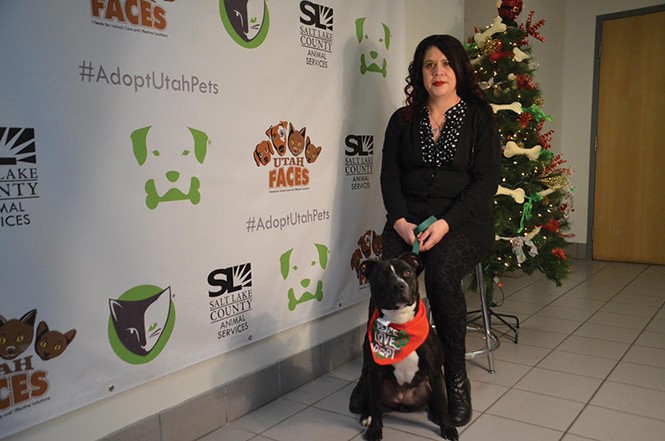
- Callista Pearson
Kiera Packer has always loved dogs, but it was a 2-month-old American Staffordshire bull terrier named Lucky that changed her life forever. Kiera witnessed Lucky being thrown from a moving car and swooped in to help. Lucky soon became her best friend, and she became an advocate for the misunderstood bully breed. She is now the Outreach & Marketing Coordinator for Salt Lake County Animal Services and also helps run the Salt Lake County (SLCO) Pit Crew.
What is the SLCO Pit Crew?
The Pit Crew is a program that we started because we needed to start addressing the high number of pit bulls that were in the shelter ... The Pit Crew program is a part of SLCO Animal Services for the dogs that are coming into our shelter. We are trying to advocate, educate get out in the community, adopt them out and just kind of change the idea of what the breed is.
Why do bully breeds get such a bad rep?
People have this idea that the dog is something that it's not; they have a reputation that they do not deserve. We try and make sure we fit good owners with them. I see the need to educate people, because I think that is where the largest problem is. People have learned things about them in the last 10 years ... or they haven't learned too much about the breed, so I love to get out there and advocate for them and tell them their history, and what the real statistics are. ... They are loyal loving dogs, that not everybody should have. But not everybody should have a chihuahua, either. So I think at the end of the day, people need to research the breed of dogs. They are stubborn, they're loyal, they're good with kids but they are not for everybody.
Is there a process that people go through when adopting from the Pit Crew?
Everybody has to go through a process of coming in meeting the dog, going out in the yard, bringing their family members—including their furry family members. Because at the end of the day, that is the one that will choose whether that dog fits in the home the best or not. They have to fill out an adoption application, and we have to approve them. Unfortunately, we do have to do a little bit of digging with the bully breeds, just because we still have insurance companies and breed specifications with apartments—sometimes they don't allow them.
What kind of support would you like to see continue from the community?
Foster homes are huge because for every foster home we have, we [can get] more information for an adopter. It frees up a kennel so, essentially, you are saving two dogs every time that you open up your home for a foster dog or a cat. Volunteering—that's a huge thing for us because when you can come in and help us make sure that they're getting out every single day. Just hitting share on Facebook can [also] make a difference, because you might have 300 friends that I don't have and they have another 300 friends. A lot of people tell me 'I can't adopt,' and that's OK. Share those posts; networking is a wonderful way to help. ... Our injured-animal fund, that's probably our biggest need because that's what we're dealing with an awful lot of the time, we try to help them and rehabilitate them.
What have been some of your harder moments working with the breed?
We do a great job here, but before we became a no-kill shelter, there were definitely some [dogs] that I lost. My first one was probably my hardest one. Her name was Diamond. There've been some like Lucky; his struggles broke my heart. ... In this job, everybody kinda always thinks its puppies and kittens and unicorns, and there is so much good and the good far outweighs the bad that I see. But I think the hard part is I get to see good and bad in people. ... But if nobody's doing it then we're not solving any problems. I like being part of the solution. Watching them walk out the door, sometimes, it's bittersweet after you have worked with them for eight months. But those are the things that carry you through the small bad portions of the day.